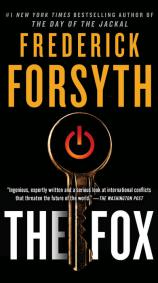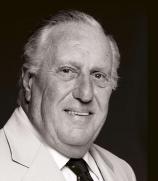The Fox
Review
The Fox
Do you like your espionage novels in black and white, or shades of gray?
The answer will probably determine your response to THE FOX, the latest from veteran thriller writer Frederick Forsyth. Of his multiple bestsellers, many made into films, THE DAY OF THE JACKAL (1971), his first, is probably still the best known. In that book, as in this one, the heroes and the villains are quite clear.
In contrast, in the spy novels of John le Carré, who was writing around the same time (and, like Forsyth, still is), the moral balance of the spectral world of secret agents is a lot shakier, a lot murkier --- and, to me, a lot more interesting. It doesn’t hurt that le Carré is one of the best prose stylists around.
Fine writing and subtle plotting are not Forsyth’s forte. Unrelenting action and incredibly authentic detail are the hallmarks of his novels. He was 29 when THE DAY OF THE JACKAL came out, fresh from a journalistic assignment about the attempt to assassinate President De Gaulle of France --- which he used as the plot of the book, mustering insider knowledge to make the scenario come alive. I remember being absolutely riveted by JACKAL as well as by his subsequent hits: THE ODESSA FILE, THE DOGS OF WAR and others.
"It’s been a long time since I’ve read a Forsyth novel, but he is still a pro at intriguingly minute details...and cinematic, slow-boil descriptions...
That was then. This is now. So it makes sense that the plot of THE FOX has to do more with computer hacking than photographing top-secret documents with tiny cameras à la James Bond. The concept is fascinating: Luke, an English teenager with Asperger’s Syndrome, a form of autism, is also the greatest cyber-genius who ever lived (Forsyth drew inspiration from the real-life cases of Lauri Love and Gary McKinnon, who, though older than Luke, were both diagnosed with Asperger’s and accused of hacking into US government computers). Luke’s talent for infiltrating supposedly impenetrable security systems, combined with a semi-retired spymaster’s strategic expertise, topples a trio of bad guys with actual or potential nuclear weapons: Russia, Iran and North Korea (twice!). His nickname: The Fox.
It’s been a long time since I’ve read a Forsyth novel, but he is still a pro at intriguingly minute details (e.g., how the coded color and design of a man’s tie can tell you about his school years, military service, club membership) and cinematic, slow-boil descriptions (the incredibly thorough preparations made by a sniper in this book reminded me of the modus operandi of De Gaulle’s would-be assassin in THE DAY OF THE JACKAL). There are some clever strategic fake-outs engineered by the spymaster, Sir Adrian Weston (although officially retired, he acts as an informal security adviser to the Prime Minister), and touches of dry wit (“Sir Adrian replied in full. He said: ‘Ah.’”).
But there are issues, too. The writing is, at best, utilitarian. Clichés and national stereotypes abound (“horny-handed kibbutznik” comes to mind), and the pace is weighed down by way too much background material. I couldn’t help but say Uh-oh when I saw that the book begins with a five-page list of “Characters and Organizations,” with acronyms galore. Plus, once the collaboration of Luke and Sir Adrian has notched a couple of victories, there is no doubt about the boy’s brilliance --- unfortunately, there is also zero suspense for the remainder of the book, since success is a foregone conclusion. A thriller should, you know, thrill, as in overcoming obstacles.
Forsyth’s cut-and-dried political perspective (he’s known as an avid supporter of Brexit) struck me as smug. The good-guy triumvirate of the UK, US and Israel (PM and POTUS are thinly veiled and mostly uncritical versions of Theresa May and Donald Trump) battles the evil empires of the East, including the “cold-eyed little man” leading Russia, known as the Vozhd (The Boss: Putin, anyone?). If Forsyth’s politics are your politics, maybe his attitudes won’t strike you as simplistic, but they did me.
But the most grievous fault, I think, is Forsyth’s failure to delve into Luke’s remarkable psyche. We get no insight at all into Asperger’s in general or Luke’s mind or character in particular; we know only that he is fragile, change-resistant and completely absorbed in the work. His tutor/companion, another cyber-geek, is said to be a “father figure” to him, but we never see this relationship in action. Although there is a twist at the end that humanizes him a bit, by and large Luke remains a symbolic figure, almost literally more a weapon than a person.
THE FOX, in short, is not Forsyth’s best, but fans will probably enjoy it anyway. For an oldster like me, the best part was the character of Sir Adrian, a stellar agent of retirement age (Forsyth himself is 80). He doesn’t defend The Free World by leaping around the roofs of buildings or breaking prisoners out of dungeons. He doesn’t pack a silenced firearm or poisoned pellet in case of capture. His brain is his chief asset: he thinks, he devises, he investigates, he delegates, he informs. And that’s refreshing.
Reviewed by Katherine B. Weissman on October 26, 2018




